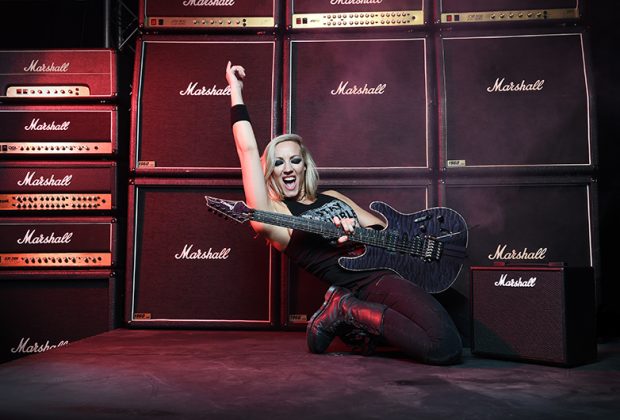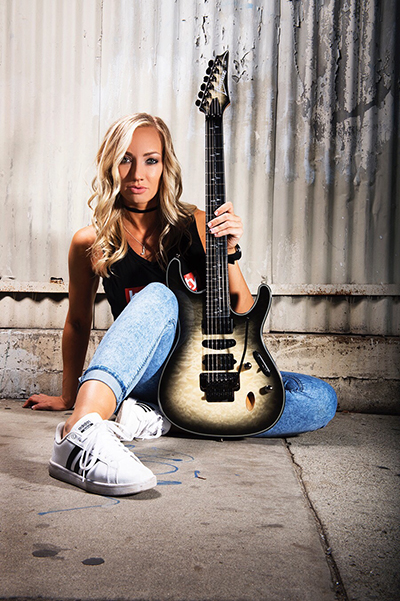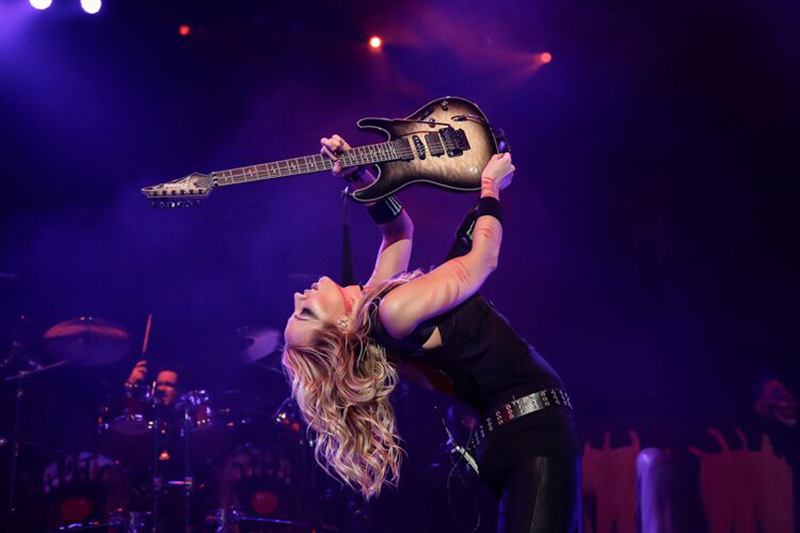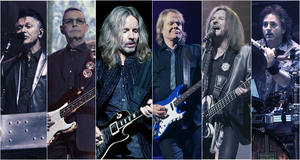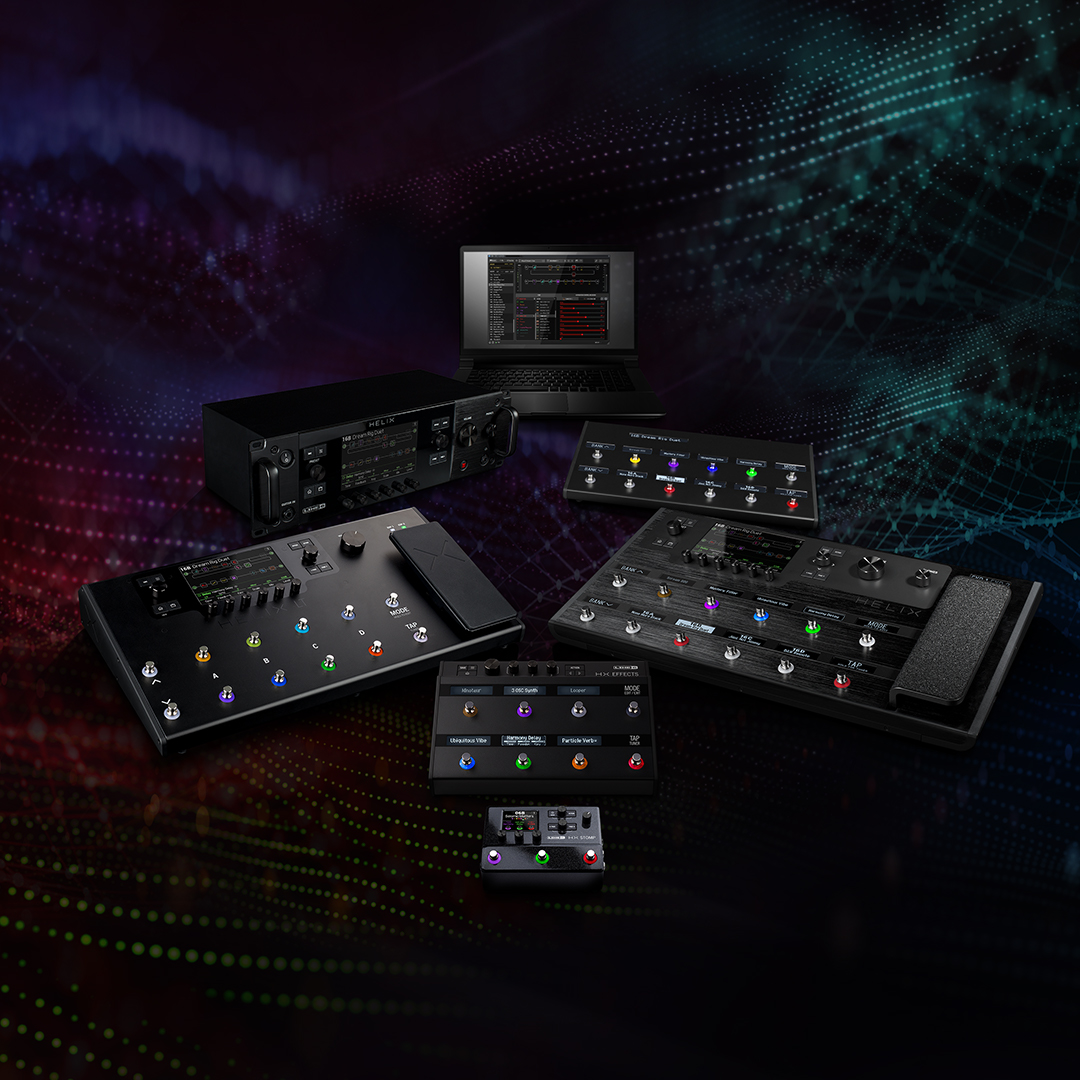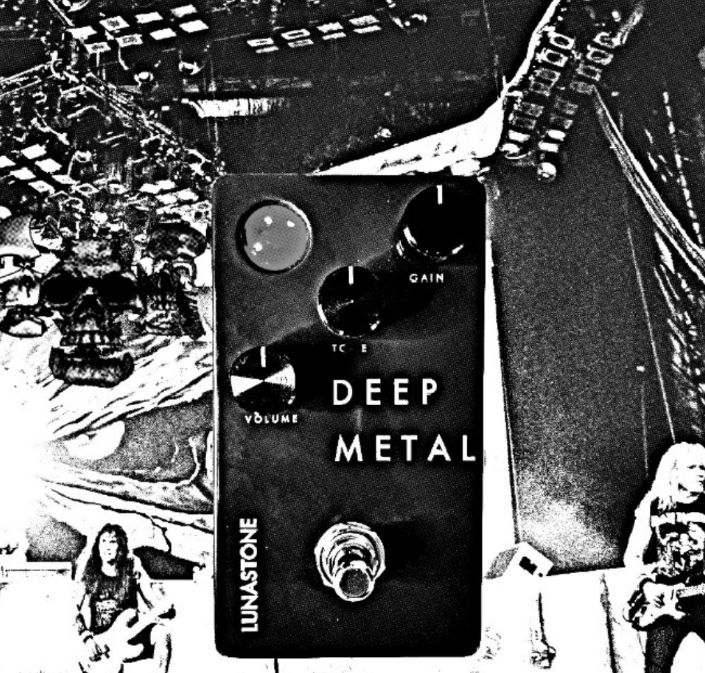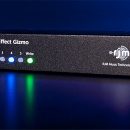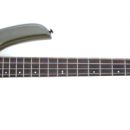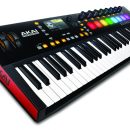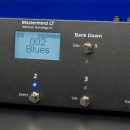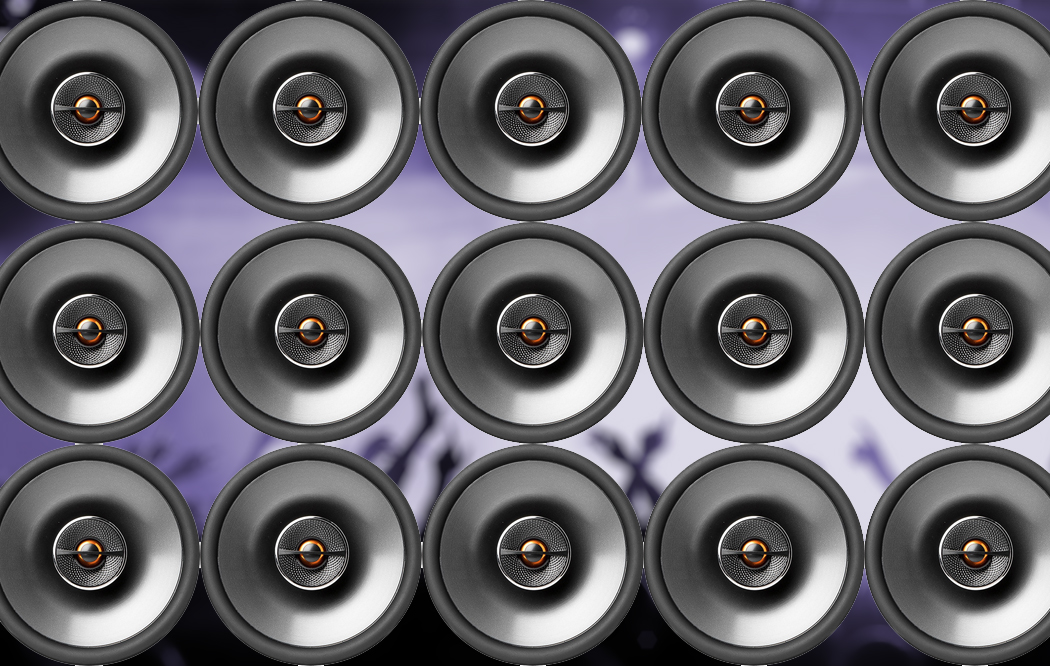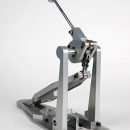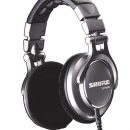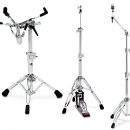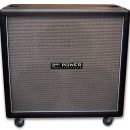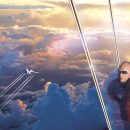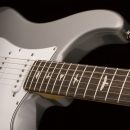Passion, joy, and great love for the guitar vie for attention every time Nita Strauss takes the stage. At first glance she looms larger-than-life, then underscores that image as her fingers move furiously, yet with confident precision, up and down the fretboard of her beloved Ibanez Jiva. It’s easily understood why she’s known as today’s First Lady of Metal.
“Everybody in my band’s an A-list player, I just don’t have time for B-list guys,” said Alice Cooper in the edgy Hired Gun documentary, a film that quickly earned instant cult status among session and touring musicians. “Hurricanita” Strauss was there of course, “A” game and all.
Alice Cooper’s reputation is that of a rock icon with an eye for talent. Before Nita joined the band it was another fierce female guitarist, Orianthi, who toured with Cooper until 2014. So the bar was set high, requiring a commitment to excellence—the key to longevity in the high pressure, high velocity world of rock n’ roll.
Cooper wanted another dynamic female guitarist capable of bouncing off the ensemble’s incendiary male players. And it worked, big time. The chemistry was instantaneous, and all anyone—including Cooper—could hope for.
Before long, Hurricanita was touring the world. Her shredding technique and charisma wowed audiences, making a lasting impression of every stripe. If you won't take my word for it, ask her quarter-million Instagram followers. And while their musical styles could not be farther apart, Nita was bred for the role: How many musicians can claim Johann Strauss in their family lineage?
While Nita certainly had a notable career prior to hitting the road with Alice Cooper, gaining attention as part of early MTV darlings Femme Fatale as well as playing guitar with The Iron Maidens (a renowned, all-female, Iron Maiden tribute band), the increased visibility was a natural fit for what was to come next:
The official release of her signature Ibanez model, the Jiva10. Plans to hit the studio, reuniting with her original band, We Start Wars. Touring with her cover band, The Starbreakers. And countless personal appearances on tap for the balance of 2018. And, at summer’s end, a debut solo guitar instrumental album.
Says Nita, “I've been putting off doing this album for a long time, and if I put it off any longer, it's just going to be Chinese Democracy [laughs]. I want it to be a snapshot of where I am in this moment, as a guitar player, and that's it…”
As Nita railed off this list of to-do items with the same matter-of-factness one might tally their weekend errands, my head spun with the force of Category 4 winds. I wondered, how does a 31-year-old woman in the City of Light keep such great command over all that goes on around her? Leveraging every opportunity placed before her? Maintaining the same commitment to her craft as she does wellness of body, mind and soul? “I don't want to overthink it too much,” she tells me. And there it was.
So, while Nita may appear to be a larger-than-life energy force who leaves fury in her wake, I contend it is her calm and centered core from where her success breathes. And like any hurricane, this force will ultimately intensify.
After seeing Steve Vai in Crossroads, that was when it stuck… This is what I'm supposed to be doing with the rest of my life.
MPc: Getting your own signature guitar is a huge accomplishment but I must compliment you on being Ibanez's first female artist with a signature guitar.
NS: Thank you, it’s an absolute dream come true. I think back to when I first signed on with Ibanez in 2008. I remember sitting in the parking lot in tears; just because I got the meeting; just because they were willing to meet with me. Then they took me on as an artist 10 years ago. I was just so delighted, honored to be a part of the team. Now, 10 years later, as the first female signature artist, I feel like it's come full circle.
MPc: There must be a significance behind the name you chose.
NS: Absolutely. Jiva is what continues on after your body is gone. So, whether you want to call it your soul, your life force… things you create that live on after your body is no more. I love the meaning, and I hope the guitar itself and the music I make with it, and the music others make with it, will live on long after my career is over.
MPc: I really do like the creative parallel and message.
NS: Well, and my Dad's band’s name was Jiva, way back, I guess it was in the ‘70s. I had the word in my head since I was a kid and when I was trying to think of a name for the guitar, it seemed perfect. My dad got me my first guitar. So again it just all came full circle.
MPc: Did growing up in a musical household and having a strong musical background influence your desire to play as a child? Have you always played guitar?
NS: I actually started out with a drum set. Then I switched to bass. Neither one really stuck. Then my Dad got me a Squier and I started playing guitar. After seeing Steve Vai in Crossroads, that was when it stuck. That was when I had that light bulb moment: this is what I'm supposed to be doing with the rest of my life.
MPc: Going back to the Jiva for a moment, compared to other guitars in the S-series, how would you say the Jiva is unique?
NS: Essentially the Jiva is the guitar I've always dreamed of designing in my head. I think every player has a guitar where they're like, Man, this guitar would be perfect if it only had a maple fret board, if it only had this, that, or the other thing. The Jiva is exactly designed to my specifications. It has a mahogany body and an ebony neck and quilted maple top.
It has my signature DiMarzio pickups, which only come in that guitar. They don't come standard on any of the other Ibanez guitars. The only way you'd be able to get them is to get the Jiva or to buy them separately and install them. I honestly feel Ibanez makes no other guitar that has pickups better than mine.
MPc: Was there something that you were looking for in your new pickups exclusively for the Jiva that you weren't getting from the ones you used previously?
NS: Definitely. The thing I love about DiMarzio pickups is they have a lot of clarity and are very transparent. You hear the tone of the guitar through the pickups, where a lot of other hot pickups you're just hearing the sound of the pickups and electronics. One thing that I wasn't getting was the perfect pickup that was great for metal, great for rock, great for big leads and big harmonics. That was what we set out to do: something quiet enough that you can do chuggy metal parts and not have a lot of hum and feedback; high output, enough that you have a lot of clarity, a lot of that big resonant tone when you're doing leads. That was really important to me.
MPc: The Jiva announcement was made at the Ibanez booth at winter NAMM. It was exciting. But now that your new model is in your rig, what is it that you like most about having the Jiva live on stage?
NS: It’s cool being able to have the guitar exactly how I want it. I love all my previous guitars. People ask me all the time (laughing), “Since you have a signature now, can I have one of your old ones?” Like, no! They're all still my children. I love those guitars so much. But I wouldn't like it as much because it has a rosewood fretboard, or I wouldn't like it as much because it didn't have the bridge that I liked. I just like having all of my favorite specs in one guitar.
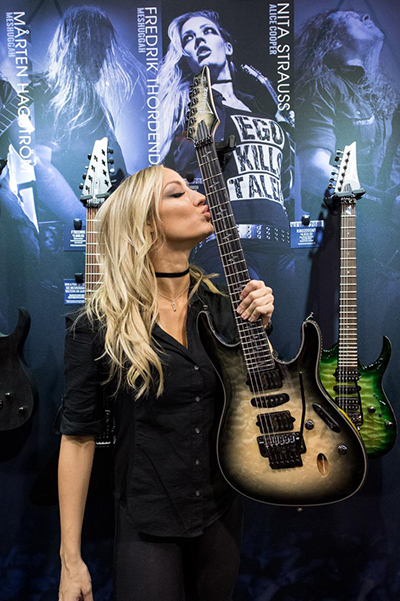
Photo: Stephanie Cabral
MPc: What amps are you using on tour with Alice? Do you use other amps or do you prefer other amps when you're on other gigs, or in the studio?
NS: With Alice I'm using a Marshall JVM410, the Satriani series, and I love it. I don't really have any need to use anything different. When I do my clinics, a lot of time I'll use a Marshall Code, and I like that. They just came out with the Code 100 head, which is really, really versatile. It's basically the Marshall modeling amp, so it's the head or they also have a 25 watt and a 50 watt combo. It has all of the other Marshalls in it. Whether you want a Plexi, you want Silver Jubilee, you want a JCM800 and you want a JCM2000. Whatever classic Marshall sound you want, the Code has that in there. If I'm not using my JVM, I will generally go with the Code for that reason.
MPc: Do you make use of many effects on your sound? Do you utilize pedals or a rack system?
NS: It's all rack mountable. All my effects come from a Rocktron Prophesy II preamp controlled by a Rocktron All Access [MIDI foot controller] on the floor. I'm a big proponent of effects. It's not for everybody.
MPc: But it’s your preference.
NS: Exactly. I like to utilize every weapon that I have at my disposal to make an amazing sound. So, yeah, I like delay, reverb, noise gate; you know, harmonizers, octavers. Anything I can find that'll make it sound cooler.
MPc: Sounds like you consider yourself a gear junkie.
NS: Absolutely. Junkie to the max. Beyond all hope. [laughing]
MPc: Would you say you have a secret to your tone?
NS: Enthusiasm [laughing]? I think tone comes from the heart. Tone comes from your fingers and your heart, it doesn't really come from your amp. You could put me and 10 different guitar players playing the same guitar through the same amp on the same setting, and it would sound different. Tone is all in how you play.
I like to utilize every weapon that I can have at my disposal to make an amazing sound.
MPc: Let’s talk a little bit about your upcoming instrumental album, Controlled Chaos. Congratulations also for blowing your Kickstarter goal away. Seriously, you blew it out of the water.
NS: Thank you.
MPc: It must have felt great having such support from your fans. Where did the idea for putting some of your own compositions out there come from?
NS: Well that's how everybody starts out. When I was a young guitar player I never played other people's stuff. I always wrote my own music. Then it got to the point where it's like, OK, you're a grown-up now, you gotta’ get a job. I decided that a much better job would be just playing guitar. That's how I [became] a hired gun, touring with other bands and other artists.
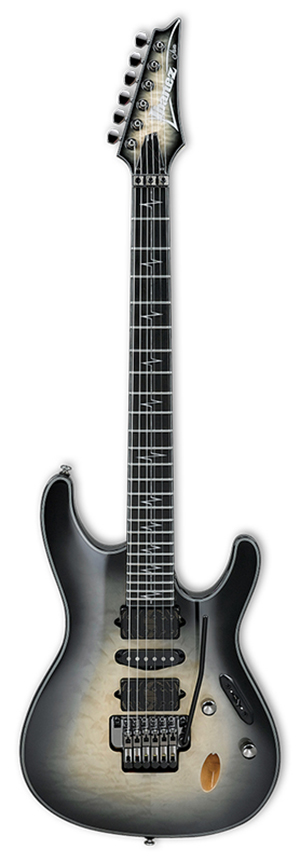 I've been touring since age 15. My first several tours were playing my music and I just sort of fell into the day-job side of being a professional guitar player. Now that I'm in a much more stable place in my career and have a little time off, the timing was really just perfect. Let's go back to where it all started. Let's go back to instrumental guitar music and put something out there I can be really proud of.
I've been touring since age 15. My first several tours were playing my music and I just sort of fell into the day-job side of being a professional guitar player. Now that I'm in a much more stable place in my career and have a little time off, the timing was really just perfect. Let's go back to where it all started. Let's go back to instrumental guitar music and put something out there I can be really proud of.
MPc: What is your songwriting process like?
NS: I imagine it's probably pretty similar to people that write songs with lyrics. I think it's really important for a good song to be about something and not just be notes that sound good in sequence, you know what I mean?
I think a lot of people have this idea of instrumental guitar music where it's just like just notes that sound good with each other; it's not a real song. All the songs I'm writing are really about something, you know? They have a beginning, a middle and an end. If you listen to “Pandemonium,” that song tells a story, you know? It has ups and downs, it has sad parts and happy parts and a resolution at the end.
And I name my songs what they're about. I don't mean to be flippant but that's what it is. I think about the emotion of the song and the story that I'm telling. The name usually comes to me even before the song is finished.
MPc: And if this upcoming solo project can leave one impression or say one thing about you as an artist, what would you like it to say about you as an artist?
NS: I think a lot of people don't really know my personality as a guitar player beyond just playing other people's songs. I would say 90% of the people that know about me haven't heard the other bands that I've been in, or the other music I’ve released. I hope that with the release of Controlled Chaos I can give people deeper insight into who I am as an artist.
MPc: Okay, let’s discuss your identity as an artist and artists that have made a huge impact in hard rock and heavy metal for you. I’d have to think, for women in an industry that's so male dominated, making it within this genre may be particularly challenging. Have you had female figures you've looked toward, either as a child growing up, as a young adult growing into your career, or even now?
NS: Well, it was definitely Jennifer Batten first. When I was a young guitar player, I didn't know who any female guitar players were. I honestly didn't know one. Then I discovered The Runaways and Heart and these amazing bands of strong women that were out there kicking ass and being awesome and strong and badass and paving the way, but I wouldn't say that they were my biggest influences.
I like guitar solos. I like super technical playing. I listen to Paul Gilbert and Marty Friedman and Steve Vai and Joe Satriani. It wasn't until I saw Jennifer Batten at the Super Bowl with Michael Jackson, saw how confident and powerful she was, and that strut across that stage looking so badass and gorgeous with her amazing hair, just shredding like nobody's business, super technical stuff…
That was a sort of an “Ah ha!” moment for me. Like, here is this badass blonde chick on the biggest stage that there is, and she's playing like that. Like, Oh. Someone else ... Someone's doing it. I can't say someone else. I wasn't playing anything like that at the time, but you know, someone's doing it. That was really inspiring for me.
MPc: That's interesting how you describe Jennifer in this particular example, in more of a hired gun role. Then of course there’s Lita Ford and Nancy Wilson and Joan Jett. Do you see your career path following a similar route to any of these women or do you see yourself going in a different direction, particularly as it relates to where you are now?
NS: Well, I think it's really important as a woman in the industry, to elevate and inspire other females. In that regard, I absolutely see my career going in that same way, because they were the women that made it not weird for us to play guitar, you know what I mean? They did it first. And it's weird for me now, so, I can't even imagine how it must have been for them back then. It's amazing that in 2018 there's this incredible surge of women who are killing it in the guitar game. You know, there's Nili Brosh and Courtney Cox and Irene Ketikidi and Gretchen Menn and Orianthi. There's just so many incredible female guitar players out there, and I'm just so happy to be a part of this surge, and hopefully help inspire some to come along with us. The women that is [laughs].
MPc: I’ve personally seen on your Instagram feed instances of mothers thanking you for the influence you had over their young daughters picking up a guitar. Your feed is rather inspirational actually; whether it’s a motivational post, a healthy eating and living post or encouraging replies to comments. You seem to feel comfortable in the role of Role Model. Did you mean for this to happen? Is it an aspect of your career that you enjoy? Does the ability to empower others come with weighty accountability?
NS: Well, it's a heavy responsibility. I'm 31 years old. I want to be a parent someday. I look at the role models that are out there now, and I think if I can be a role model for a young girl who wants to get into music, if I can stand up and show them you can live a healthy lifestyle, or that you don't have to get caught up in all the nonsense that goes on with touring. Because I did that. There was a time when I was going out, drinking, partying and living a less than healthy lifestyle. And I was unhappy. Now that I'm in this position, that I can possibly elevate and inspire a new generation to do what I'm doing, I do want to make the most of that opportunity. I do want to live my best life and encourage other people to live their best and their strongest life.
MPc: Can you recall any challenges you may have faced in the business as a result of gender and how you may have overcome those challenges?
NS: Without this turning into a five-hour girlfriend gab fest, I think really the most important thing that I can say on the subject is: there are going to be challenges, and the only real way to combat those challenges is to not treat yourself as a woman in this industry.
It would be like going into a room full of people with black hair and expecting to be treated differently because I have blonde hair. You know, I don't think it's always a gender thing. I think it's just that people don't always know how to deal with someone that's different than them.
And, if you’re different, and you walk into a room expecting special treatment, then you're going to receive special treatment, but it's not always going to be the good kind. Anybody that knew me from before I had a guitar tech will tell you, I always carried my own amp. I always changed my own strings. I always brought my cab in and out of the car myself. I was never walking up to shows saying, “Hey, can someone carry this for me because I'm a girl.” You know, as long as you come into any situation and own it and don't expect special treatment and don't lean on anybody and don't lean on your gender, and then you won't receive special treatment because of your gender.
MPc: I agree, as a woman, if you disregard your own gender, others will be more likely to disregard it as well. Now that’s one thing in an office setting. But rock n’ roll? I imagine there are some interesting grey areas that can create less than comfortable situations.
NS: Well, it would be unreasonable to expect that you won't be treated differently sometimes. I was recently in a YouTube video, interviewed by a popular YouTube personality. Several of the comments were, “Oh, your wife. You'd better expect a call from your wife about this interview.” It was literally me and this guy sitting and talking just as you and I are talking now, playing guitar, and chatting.
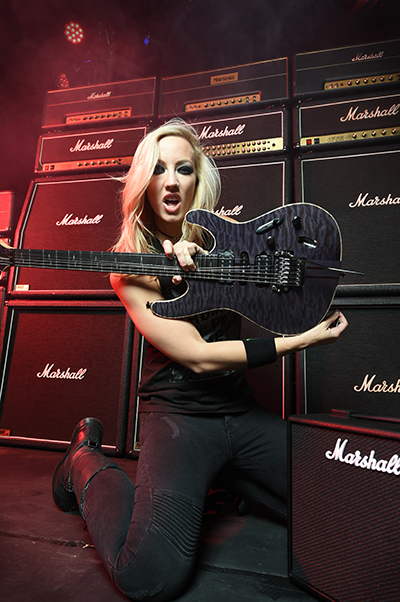
Photo: Stephanie Cabral
MPc: Because you have the misfortune of being female plus talented plus beautiful…
NS: You know, let's give even another example. I just posted a picture, I did an interview with Al Joseph from Hyvmine and Ernie C from Body Count. I posted a screen grab from the interview where the three of us were sitting on a couch. Someone said, “This looks like the beginning of a porno.”
MPc: My gosh.
NS: It's like, what, three guitar players just sitting on a couch? Every once in a while, it’s (frustrating). But if you let yourself be bothered... Not you, but if women in this business let themselves be bothered every time they feel like they're not treated fairly, you're going to be miserable. You can't let things like that get to you too much, even though it's hard.
No woman is doing anything wrong by being a woman and doing her job. I didn't do anything wrong, and neither did this YouTube personality by sitting there and having the interview that we were both brought there to have. We didn't talk about anything at all except playing. But there are still comments. At a certain point, it's just about having a little bit of a thick skin and letting it roll off your back, as long as you know you've behaved appropriately your integrity is intact.
MPc: And for those women still working on developing that thick skin? Any advice based on your experiences?
NS: If there's one thing that I've learned in my time doing this, and you know, I don't like to say stuff like that but I think you understand, is that we have to look out for each other. Women in this business have to look out for each other, because we go through a very specific set of challenges and trials that a lot of people don't understand. You know, my boyfriend is my manager and he doesn't understand a lot of this stuff, even though he sees most of it. There's a lot of things that only women in the music business will be able to commiserate about.
MPc: Right.
NS: Guys don't understand.
MPc: Sure. And it's certainly not their fault. It's just about being different. So you’ll tend to find commonalities with others who have the same difference. And in this case that’s women.
NS: Yes.
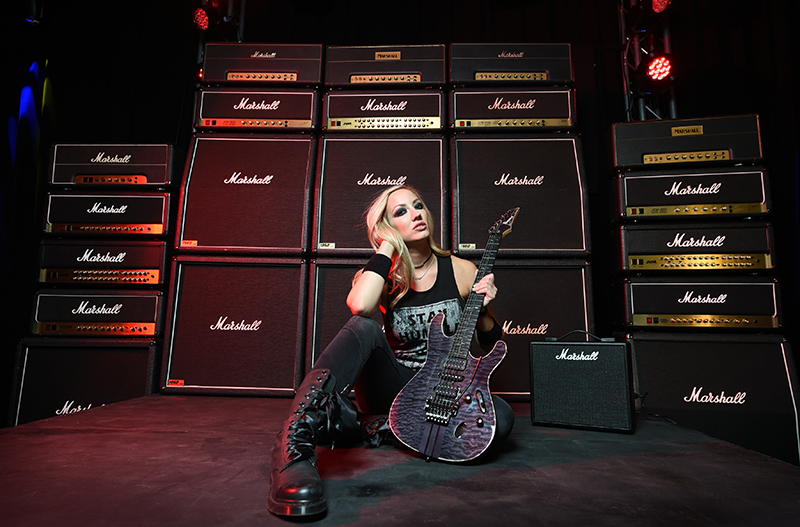
Photo: Stephanie Cabral
MPc: Of course I can’t help but think of Alice Cooper’s famous line in the Hired Gundocumentary about “B list” guys; despite it being a pretty gender neutral term.
NS: Right. And girls! [Laughs.]
MPc: How did your role with Alice Cooper come about?
NS: I started playing with Alice in 2014 after Orianthi left the band. I know they were looking for a female guitar player to keep the dynamic of the band the way that it was. It was Kip Winger that put the first call in for me. He had seen me play on the Monsters of Rock Cruise a few months prior, and when he heard that Alice's camp was looking for a new guitar player, he did me the huge service of sending an email and sending them a video of me. Next thing I knew, I was there. I was meeting Shep Gordon and Bob Ezrin, and a few weeks later I was off to the first rehearsals.
MPc: Well thank you, Kip Winger!
NS: Right? Thank you, thank you, and thank you.
MPc: So, some guitarists practice scales every day, right? While others don't even pick up their guitar between shows. What is your routine in terms of practice or keeping up your musical chops?
NS: Well, I don't get to practice as much as I'd like because I'm always working on something. I wish that I had a little more downtime to relax and actually be able to play. Play stuff I just want to play. But between my clinics and sessions, recording my record, writing new Alice songs, learning songs for my cover band, Starbreakers, and writing songs for my band, We Start Wars, it's like there's a never ending to-do list of stuff every time I pick up a guitar. So I would like to carve out a little more time to run scales and learn some new techniques. But it’s really about work right now. It's a fun job, but it is work.
MPc: Do you have any warmup routines for right before the show?
NS: Well, the first thing that I always, always, always do is stretch. I stretch in a really specific way. A lot of people say, “Oh yeah, I stretch,” but they always stretch their fingers out. I start by stretching my whole hand and my whole arm, on both arms, really extensively. For a full couple minutes on my arms. Then I actually continue on to stretch my whole body, because I'm very physical onstage. If I don't stretch my neck and my legs and my back and my shoulders, I will be in so much pain. I know 31 is not old, but it feels old. You know? I have to stretch. I stretch my legs, I stretch my quads, I stretch my hamstrings and my calves. I stretch my lower back and my upper back, and that's what allows me to keep running around onstage and jumping off the thing and bending my body in half, because I make sure to stretch properly before and after the show.
MPc: And how do you incorporate your commitment to a healthy lifestyle into the demands of touring?
NS: Taking the right supplements is something that has really been a big part of my stage routine. Taking amino acids and protein and L-carnitine has been something that really elevated my stage show to the next level. My coach, Ingrid Romero—who is my gym coach—she has a line of supplements called EDGE Supps. I take their branch chain amino acids before going onstage. I make a protein drink, and I drink half before the show and half after the show. Little things like that really go a long way towards making my show better. You don't want to run across a big stage one time and be out of breath.
Having a solid gym routine, having solid nutrition, all key. I have my meals sent out on tour from a company called Trifecta Nutrition. They send out all my meals so I'm eating healthy. So between good nutrition and good exercise and stretching properly before the shows, it makes you kind of unstoppable.
MPc: You're driving down PCH, an iconic song comes on the radio. You put the pedal to the metal and you're rocking out. What song is it?
NS: Ooh. I'm going to go with “Summer Song” by Satriani. That's my driving down PCH with the windows down song.
MPc: Aside from your upcoming solo project, are there any other projects you're involved with right now that you want to tell us about?
NS: Yes. So many.
MPc: Oh my God, tell us! [laughs]
NS: Well, my band, We Start Wars, we’re going into the studio hopefully before the end of 2018. I have my cover band, The Starbreakers, which, as with We Start Wars, it's hard to get everybody in the same place, but we do play shows as often as we can. Of course, the release of the Jiva will be August, and that means a lot of guitar clinics and promotional stuff going on surrounding that release. And I’m excited because after this interview, actually, we’re starting to track drums for my record.
MPc: Do you have a rough release date?
NS: September.
MPc: September. Wow. So it will be a busy summer.
NS: [Laughs.] Yes. September. Maybe the end of September. That was my goal from the start, and as time goes on it's looking very realistic.
Nita Strauss kicks off Guitar Clinics for her Ibanez Jiva10 August 7, in Colorado Springs, Colorado and clinics continue along Alice Cooper tour stops including Guitar Center in Las Vegas on August 9 with additional dates in September and October. For details on how you can attend one of Nita’s clinics check in with her Instagram or Facebook feeds.
For more information on Nita Strauss, including how to get your copy of Controlled Chaosor where to catch her on tour, visit www.nitastrauss.com.
YOU MAY ALSO LIKE:
GUITAR REVIEW: Ibanez Jiva10 Nita Strauss Signature Guitar
DVD/FILM REVIEW: Hired Gun: Out of the Shadows, Into the Spotlight
ARTIST FEATURE: Orianthi: Guitar Love
Feature Photo: Stephanie Cabral

